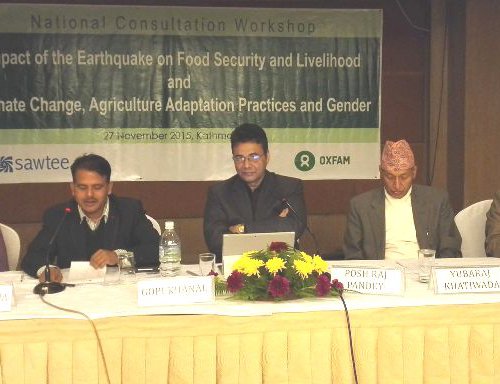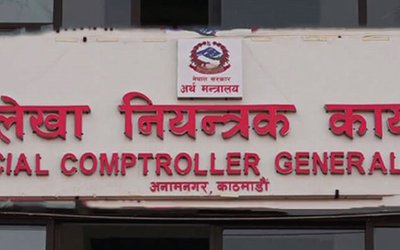
South Asian (SA) governments must enact a specialized and comprehensive law on rights to food immediately in order to battle the region’s prevailing and chronic hunger that left more than 304 people going to bed hungry every day, food security experts and policymakers from five SA countries said.
South Asian governments are investing a lot in terms of direct and indirect investment in food and agriculture. Many laws, rules, regulations, policies, and administrative measures have been introduced but they are not coherent and comprehensive,” said Bangladesh’s Information Minister and Chairperson of All Party Parliamentary Group on Food, Agriculture and Rural Development Hasanul Haq Inu.
Despite Nepal’s Interim Constitution that guarantees food sovereignty, Pakistan’s Zero-Hunger Action Plan, Bangladesh’s massive investment in social protection, or Sri Lanka’s constitutional change, it is hard to see poor people have three meals everyday with existing legal loopholes and many related issues missing,” he said, adding that the rights to food bill in India could be an inspiration for other SA governments.
Lilian Mercado, Deputy Regional Director of Oxfam Asia, noted that South Asia has experienced the second fastest rate of economic growth in the world, enjoying an annual growth rate of six percent on average in the last two decades. Yet poverty has gotten worse as inequality has risen and become more severe.
Studies showed it could grow at the steady rate of around 5.5 percent in the next 25 years. But factors such as climate change, rising inequality, food price hike, population growth, rapid urbanization as well as competition for natural resources could hamper or reverse the progress. It reflects a need for South Asian governments to transform their political pledges on food security into immediate action,” she said.
During the two-day meeting, almost 50 representatives from Bangladesh, India, Nepal, Pakistan, and Sri Lanka discussed findings in the Regional Synthesis Report on food-related legislation in each of the country. Four categories of food insecurity factors were discussed including production/productivity, consumption/distribution, environment, and cooperation, along with solutions that are in line with national, regional, and international goals.
Also joining the discussion were Gagan Thapa, Member of Committee on Natural Resources and Means of the dissolved Constituent Assembly of Nepal; e Buddika Pathirana, Member of Parliament of Sri Lanka; Chitra Lekha Yadav, former deputy-speaker of Nepal’s House of Representatives; Dr Somsak Pipoppinyo, Nepal Country Representative of Food and Agriculture Organization; Dr Dinesh Chandra Devkota, former Vice-Chairman of National Planning Commission of Nepal; and Hari Roka, Committee Member of Natural Resources, Financial Rights and Revenue Sharing of Nepal’s dissolved Constituent Assembly.
The bottom line is we must take into account people’s rights to food. It should be central to any law related to food security. It must serve all particularly women and marginalized groups even in times of crisis whether economic or emergency given the region’s status as the world’s most vulnerable place to natural disasters and climate change,” Mercado added.
However, South Asia will have to face some other daunting tasks that hinder positive change – coherence in policies, coordination in enforcement, and most importantly, political will.
All those laws the region have in the past, though now outdated, were very good in those times, many still working well now. Except they’re good and effective in the papers because they are either not implemented or fully enforced,” said Dr. Ratnakar Adhikari of South Asia Watch on Trade, Economics and Environment (SAWTEE), Oxfam’s research partner in South Asia. Participants urged the governments to come up with a Comprehensive Agrarian Reform Program (CARP). The program, which focuses on land acquisition and distribution to help landless farmers, is aimed at securing the availability, accessibility, utilization, and stability of foods. Experts believed that it would lead to political commitment and active action on food security-related legislation.
The specialized and comprehensive rights-to-food law must have clear-cut tools and measures to show strong political will. It’s well known that South Asian countries perform poorly in this area so we can’t ignore this any longer. The law must be implemented to be truly effective,” Dr Adhikari said.
- TANAHU HYDROPOWER PROEJCT: A Significant Achievement
- Apr 15, 2024
- AMBASSADOR HANAN GODAR: Sharing Pain With A Nepali Family
- Mar 30, 2024
- VISIT OF KfW AND EIB TO NEPAL : Mission Matters
- Mar 25, 2024
- NEPAL BRITAIN SOCIETY: Pratima Pande's Leadership
- Mar 24, 2024
- NEPAL ARMY DAY: Time To Recall Glory
- Mar 15, 2024
















